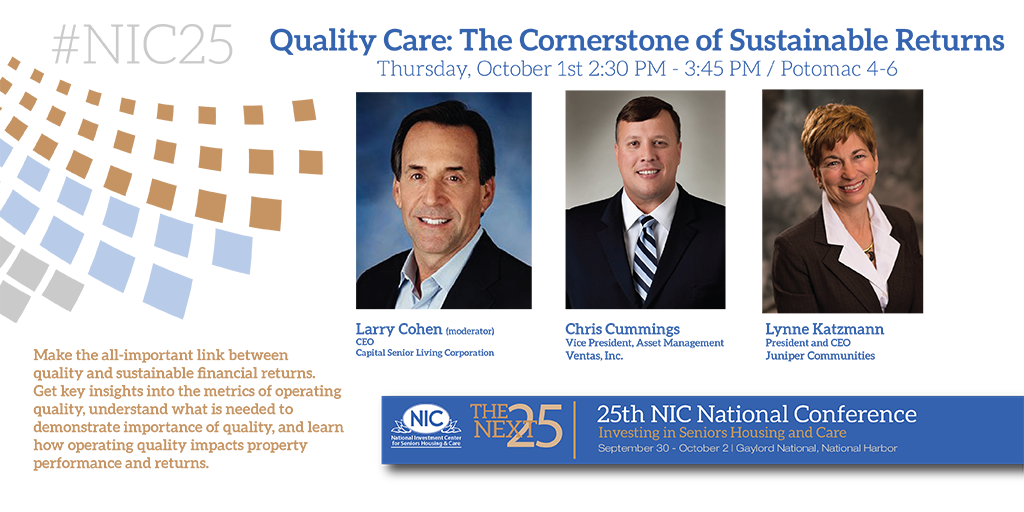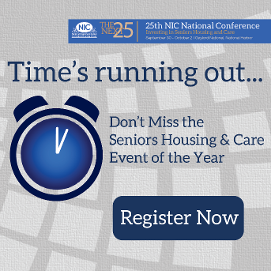Panelists to Discuss the Impact of Quality on Financial Returns

Operators know from experience that the delivery of high quality care to residents usually leads to robust referrals and strong occupancies. Reputations count. And investors understand that properties with a focus on quality care typically generate solid cash flows and high returns.
But what’s the best way to measure quality care? And how can operators and investors translate quality data into sustainable financial returns?
A panel of experts will provide insights into the growing importance of the quality of care during a session at the upcoming 25th NIC National Conference, Sept. 30-Oct. 2, Washintgon, D.C. The session will be moderated by Larry Cohen, CEO at Captial Senior Living Corp. He will be joined by panelists Chris Cummings, vice president, asset management, Ventas, Inc.; and Lynne Katzmann, president and CEO at Juniper Communities.
The session, “Quality care: The Cornerstone of Sustainable Returns,” will be held at 2:30 p.m., Thursday, Oct. 1.
In a preview of the session, panelists agreed that health care real estate, including seniors housing and care, is a business characterized by the success of the building operator. And the quality provided by the operator has a direct relationship to financial results.
“Quality is indicative of performance,” said Cummings. “Better quality leads to greater income from higher rents.” During his presentation at the NIC Conference, Cummings plans to share data that correlates quality assurance scores with occupancies, referrals, net operating income and customer satisfaction.
Cohen emphasized that high quality care can help increase returns generated through operations. Improving cash flow produces an immediate benefit to the investor.
Another reason quality counts is that it can be an indicator of sustainability, Katzmann said. In other words, the delivery of high quality care usually signals that the operator can continue to provide strong cash flow during downturns, or if government reimbursements are reduced. She added that quality measures will become an even more important factor in the coming years as more and more reimbursements are based on resident health outcomes. “That’s an important point,” she said.
Measurement
The session panelists will explore how to measure quality.
Capital Senior Living, for example, has a full-time staff of clinical nurses who conduct on-site audits. Regional managers also take part in the audits. The audits identify trends and results are reported quarterly to a quality assurance team. “There’s a lot of discussion,” said Cohen, who will review the audits in more detail during his presentation. “It keeps everyone focused.”
At Juniper, data is collected, put in a scorecard and reviewed either daily, weekly, monthly, quarterly or annually, depending on the measure. Data includes a laundry list of items such as medication errors, falls and skin tears. The scorecards provide a roadmap of what’s working and what areas need to be fine-tuned. “Moving to electronic health records has made collecting data much easier,” said Katzmann.
As an investor, Ventas’ Cummings noted that operators are vetted based on a number of factors including reputation, and history in the industry. State survey information is reviewed as well as the results of the operator’s internal quality assurance programs. Generally, he said, high quality operators have better scores on state surveys as well as fewer liability claims.
Though panelists aren’t predicting the introduction of national quality standards anytime soon, they will discuss the migration of quality measures into the seniors housing space. Quality measurement systems meant for skilled nursing facilities are being retooled for seniors housing properties. “The technology allows care providers to reduce administration and focus on care,” Cummings said.
Another important outgrowth of technology is employee training. Capital Senior Living, for example, has online training for workers on best practices. “Training is a big component of quality,” said Cohen. “Ultimately, we are enhancing the product for the residents and their families. And that ties back to financial performance, cash flow and the value of the real estate.”

